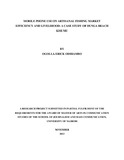| dc.description.abstract | This project sought to assess and analyze satisfaction with mobile usage in artisanal fishing market efficiencies and improving livelihood. The study was basically a survey that used both qualitative and quantitative approaches. Simple random technique was used to select 10 fishermen using cell phone daily for a focus group discussion for a period of seven days. This gave a total of 70 fishermen that participated in the research. Only fishermen using handset were purposively selected. Data were analyzed using inferential and non inferential statistics. The findings in this study suggest that the availability of mobile phone has facilitated information flow among fishermen in many ways. The study observed a shift in the way fishermen sell their catches, with about a third now selling their catches through mobile phone arrangements to customers instead of the traditional form of selling through face-to-face auctioning at their home landing sites. This arrangement has helped about 12% of the fishermen to bypass middlemen and sell straight to their customers. In particular, the study found that 22% of the fishermen used the phone specifically to access price information from the various markets/landing sites, and the evidence showed a significant increase in the number of landing sites visited monthly after the advent of mobile phones. The survey found four major categories of reasons fishermen gave for using mobile phones: cost reducing factors, safety factors, coordination factors, and market expansion factors. Since it was not feasible in this study to obtain direct data on prices before and after introduction of mobile phones, further research to investigate the impact of mobile telephony on artisanal fishing (or other occupations with variable prices) in other countries could usefully be done on a randomized experimental basis with tracking of prices before and after provision of mobile phones to those selected. | en |

